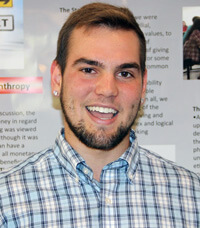- May 27, 2014
- By Liam Farrell

The 52 Maryland students in a popular philanthropy class that donates $10,000 of real money to nonprofits had big issues on their minds this semester: sex trafficking; gun violence; the prison pipeline.
Supporting childhood cancer research barely registered at first for the undergraduates in the “Art and Science of Philanthropy” course supported by the School of Public Policy’s Center for Philanthropy and Nonprofit Leadership, the Honors College and the College Park Scholars Public Leadership Program.
Enter Nick Voyton ’15. The accounting major singlehandedly convinced his classmates to shift their focus and take up that cause, focusing on facts and figures to back his case—rather than his own struggle with childhood leukemia. He also talked about Zach Lederer, the men’s basketball student manager who died earlier this year of brain cancer after gaining viral fame for his inspirational flexing pose, called “Zaching,” on a hospital bed.
In early May, the students split the funds between the Hope for Henry Foundation, which provides in-hospital gifts, parties and events for patients, and Children’s Cause Cancer Advocacy, which works to develop new therapies and help with the challenges faced by survivors.
Associate Professor and University Honors Faculty Fellow Noah D. Drezner, who taught the course with Jennifer Littlefield, associate director of the center and the leadership program, says the experience was a powerful display of how an individual can rally people to a cause.
“We can all be philanthropists,” he says. “We can all make a difference.”Voyton has only a few memories of being so sick from ages 2 to 10—his parents buying him an action figure each time he got a round of chemotherapy, a classroom countdown to when he would be declared cancer-free. Overall, he says, he was “really kind of oblivious, which was a good thing.”
His choice of cause was a marriage of the personal and the universal—“Cancer affects everyone in one way or another”—and the more research he did showed how overlooked childhood cancer can still be in the scientific world. Voyton discovered that only 4 percent of federal dollars for cancer research go to childhood illnesses and saw them barely mentioned on the websites of big research centers. The treatments, he says, haven’t advanced far beyond what he had more than a decade ago.
The class requires students to select their own cause for the funds and then do further research like site visits and interviews to select nonprofit recipients in the D.C. area. Small groups have had success before, but Drezner says that until now, no individual had ever successfully lobbied his or her classmates.
“I think one of the reasons we backed Nick’s proposition was his charismatic nature,” says Nathalia Cibotti, another student in the class, “and the fact that a Maryland student, Zach, died just a week before we decided on our grant topic.”
A female engineering major wrote in a post-class reflection that she normally avoids speaking up in class but has begun to see how her voice can matter.
“When I read that, my academic year, if not my academic career, was made,” Drezner says.
For Voyton, this was an early experience in what he hopes is a lifetime of philanthropy, all starting with the goal of having others join in with him.
“Usually I’m all smiles,” he says. “But I had a pretty big smile.”
Tags
Student Experience